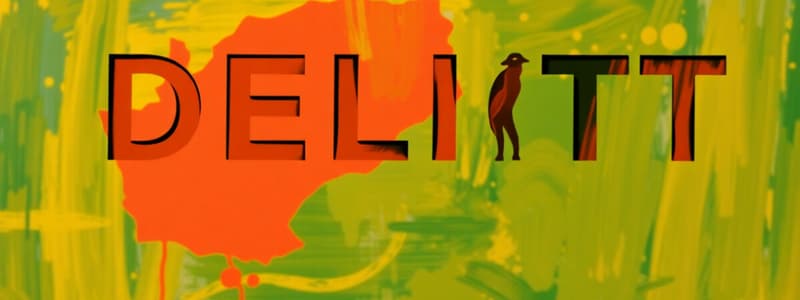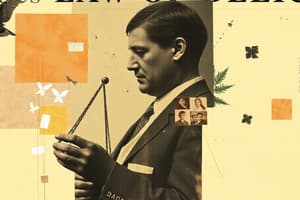Podcast
Questions and Answers
Which legal system forms the foundation of South African law of delict?
Which legal system forms the foundation of South African law of delict?
- Roman-Dutch law (correct)
- English law
- African customary law
- All of the above
What documents primarily influence the development of the common law of delict in South Africa?
What documents primarily influence the development of the common law of delict in South Africa?
- The Constitution and various Acts (correct)
- Unwritten customary laws
- International law and regulations
- Historical treaties and agreements
What is the significance of the case Nkala and Others v Harmony Gold Mining Co?
What is the significance of the case Nkala and Others v Harmony Gold Mining Co?
- It abolished the actio legisl Aquiliae.
- It introduced the concept of patrimonial loss.
- It established new tort laws in South Africa.
- It dealt with the transmissibility of delictual claims after death. (correct)
Which Act relates specifically to claims for damages from road accidents within South African law of delict?
Which Act relates specifically to claims for damages from road accidents within South African law of delict?
Under which principle can claims for patrimonial loss be transmitted to a deceased's estate?
Under which principle can claims for patrimonial loss be transmitted to a deceased's estate?
What is the main characteristic of non-patrimonial loss claims regarding transmissibility?
What is the main characteristic of non-patrimonial loss claims regarding transmissibility?
Which act governs the apportionment of damages in South African delict law?
Which act governs the apportionment of damages in South African delict law?
What foundational principle does South African law of delict share with Anglo-American tort law?
What foundational principle does South African law of delict share with Anglo-American tort law?
What does the common law rule concerning claims for pain and suffering state regarding the plaintiff's death before litis contestatio?
What does the common law rule concerning claims for pain and suffering state regarding the plaintiff's death before litis contestatio?
Which section of the Constitution requires courts to promote the Bill of Rights during common law interpretation?
Which section of the Constitution requires courts to promote the Bill of Rights during common law interpretation?
Which of the following delicts involves wrongful property damage?
Which of the following delicts involves wrongful property damage?
In Roman law, which type of delict entails the liability for the actions of domestic animals?
In Roman law, which type of delict entails the liability for the actions of domestic animals?
Which historical law provided an independent remedy for non-patrimonial losses, like pain and suffering, in Roman-Dutch law?
Which historical law provided an independent remedy for non-patrimonial losses, like pain and suffering, in Roman-Dutch law?
What must be proven for a defense of automatism to succeed in a delict case?
What must be proven for a defense of automatism to succeed in a delict case?
Which of the following actions is NOT recognized as a legitimate claim under the action for pain and suffering?
Which of the following actions is NOT recognized as a legitimate claim under the action for pain and suffering?
What does the term 'litis contestatio' refer to in legal proceedings?
What does the term 'litis contestatio' refer to in legal proceedings?
Which of the following is NOT considered a requirement for delictual liability?
Which of the following is NOT considered a requirement for delictual liability?
What distinguishes 'official customary law' from 'living customary law'?
What distinguishes 'official customary law' from 'living customary law'?
Which of the following conditions excludes liability for conduct resulting from automatism?
Which of the following conditions excludes liability for conduct resulting from automatism?
The concept of 'vicarious liability' refers to which of the following?
The concept of 'vicarious liability' refers to which of the following?
What characteristic of liability is associated with 'quasi-delicts'?
What characteristic of liability is associated with 'quasi-delicts'?
Flashcards
Hybrid legal system
Hybrid legal system
South African law is a blend of Roman-Dutch law, English law, and African customary law, influenced by the Constitution.
Common law basis of delict
Common law basis of delict
The foundation of delict in South Africa is derived from established common law principles.
Constitutional impact
Constitutional impact
The Constitution of 1996 has a significant influence on the development of delictual principles, guiding them towards inclusivity and the protection of human rights.
Key actions in delict
Key actions in delict
Signup and view all the flashcards
Comparative delict approach
Comparative delict approach
Signup and view all the flashcards
Historical relevance
Historical relevance
Signup and view all the flashcards
Nkala case & transmissibility
Nkala case & transmissibility
Signup and view all the flashcards
Common law adaptation
Common law adaptation
Signup and view all the flashcards
Non-transmissibility of Claims
Non-transmissibility of Claims
Signup and view all the flashcards
Section 39(2) of the Constitution
Section 39(2) of the Constitution
Signup and view all the flashcards
Delict
Delict
Signup and view all the flashcards
Damnum Iniuria Datum
Damnum Iniuria Datum
Signup and view all the flashcards
Iniuria
Iniuria
Signup and view all the flashcards
Liability for Harm Caused by Animals
Liability for Harm Caused by Animals
Signup and view all the flashcards
Quasi-Delicts
Quasi-Delicts
Signup and view all the flashcards
Voluntary Conduct
Voluntary Conduct
Signup and view all the flashcards
Automatism
Automatism
Signup and view all the flashcards
Vicarious Liability
Vicarious Liability
Signup and view all the flashcards
Accountability
Accountability
Signup and view all the flashcards
Action de Pauperie
Action de Pauperie
Signup and view all the flashcards
Action de Pastu
Action de Pastu
Signup and view all the flashcards
Impulsive or Spontaneous Acts
Impulsive or Spontaneous Acts
Signup and view all the flashcards
Prior Conduct Leading to Automatism
Prior Conduct Leading to Automatism
Signup and view all the flashcards
Study Notes
Sources of Delict in South African Law
- South African law combines Roman-Dutch, English, and African customary law.
- Delictual principles are predominantly based on common law.
- Key legislation impacting delict includes the Road Accident Fund Act, Consumer Protection Act, Prescription Act, and Apportionment of Damages Act.
- The 1996 Constitution guides common law development to align with multicultural values and the Bill of Rights.
Comparative Perspective
- South African law uses general principles like actio legis Aquiliae and actio iniuriarum.
- Anglo-American systems have distinct torts for specific situations.
Historical Background
- Courts often review historical origins (Roman and Roman-Dutch law) to understand delictual principles.
Case: Nkala v Harmony Gold Mining Co
- Issue: Transmissibility of delictual claims (e.g., pain and suffering) to deceased estate.
- Plaintiffs' Argument: Current and former mineworkers suffering from work-related illnesses; sought recognition of liability for pain and suffering.
- Court's Findings: Claims for patrimonial loss (e.g., medical costs) are transmissible regardless of the stage of proceedings. Claims for non-patrimonial losses (e.g., pain and suffering) are transmissible only after litis contestatio. (The claim may disappear if plaintiff dies before litis contestatio). The court developed common law to comply with the Constitution's section 39(2) objectives.
Historical Development of Delictual Actions
Roman Law
- Delictual obligations arose from contracts, delicts, or quasi-delicts.
- Four recognized delicts: furtum (theft), rapina (robbery), damnum iniuria datum (wrongful property damage), iniuria (insulting behavior).
Damnum Iniuria Datum
- Initially for direct physical damage (e.g., injury to livestock).
- Later to include patrimonial loss without direct physical damage (e.g., loss of slave).
Iniuria
- Covers physical assault, dignity infringement (e.g., tearing a toga), and reputational harm.
Damage by Animals
- Liability for harm by domestic, grazing, and wild animals (actio de pauperie, actio de pastu, actio de feris).
Quasi-Delicts
- Liability without fault in scenarios like objects falling, dangerous items, and innkeepers' liability (nautae, caupones, stabularii).
- South African application: Similar to modern South African rules, actio de effusis vel deiectis, and actio de positis vel suspensis actions are continued. The scope remained limited to the Roman principles and was not vastly expanded.
Case: Swart v Shaw t/a Shaw Racing Stables
- Issue pertinent to the innkeepers' liability recognized in Roman law.
- Limited application: Applicable to traditional innkeepers and stablekeepers, not modern equivalents (e.g., racehorse trainers).
Action for Pain and Suffering
Roman Position
- No action for pain and suffering under actio legis Aquiliae; individuals' bodies not considered "property."
Roman-Dutch Position
- Independent remedy for non-patrimonial losses (pain, suffering, disfigurement, loss of amenities).
- Originated from Germanic law, separate from lex Aquilia.
Modern Evolution
- Developed into the current action for pain and suffering.
African Customary Law and Delict
- Distinction between official customary law and living customary law; no clear criminal/delict distinction.
- Recognized delicts: sexual wrongs, property damage.
- Injuries or deaths, traditionally crimes, became delicts when certain stipulations were amended by statutes, such as the Black Laws Amendment Act 76 of 1963.
Study Unit 2: Conduct
- Delictual liability hinges on voluntary human conduct.
Conduct Types
-
Positive physical act.
-
Positive statement or comment (commission).
-
Failure to act or speak (omission).
-
No general duty to prevent harm to others.
Animal Behaviour
- Actions related to domestic animals that involve fault on the owner's behalf.
- Liability for damage to plants or crops caused by grazing animals.
Human Conduct
- Only natural persons can be directly held liable.
- Juristic persons (e.g., companies) can be sued; actions of directors become the company's actions.
- Employers may be held vicariously liable for employee delicts.
Voluntary Conduct & Defence of Automatism
-
Voluntary conduct demands capacity to direct muscular activity.
-
Children and the mentally ill may lack accountability.
-
Defence of automatism: defendant must demonstrate involuntary (e.g., compulsion, reflex action, unconscious state) act.
-
The defence of automatism will not succeed when acts are impulsive, spontaneous, or when the defendant intentionally set a stage for harm.
Studying That Suits You
Use AI to generate personalized quizzes and flashcards to suit your learning preferences.




